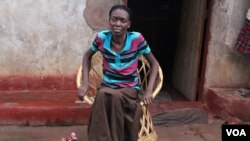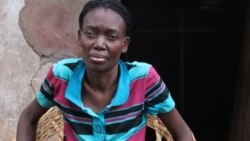Thirty-six-year-old Anna Lungisani is a resident of Overspill in Epworth. She is blind and is HIV positive. Lungisani, a widow, went blind at the age of 29, soon after the death of her husband.
Lungisani now stays with her father Aiwell Lungisani, who is employed as a security guard in the area. For a person with her condition, she needs to go for regular check-ups, where they have to hire a car for $ 10 per visit. In addition, Anna needs to buy basic needs and to have a special diet which is fairly expensive by her living standards. Her fathers’ salary of 80 dollars per months is not enough to sustain the two of them.
Occasionally, Lungisani is assisted to bath by her aunt who stays 10 kilometres away and during holidays, her 12-year-old sister Rachel helps with household chores.
“My young sister who is twelve years now helps me to bath. I don’t go to the toilet because I can’t walk properly. I always bath in this house. If you look at my clothes they are dirty right now. I have got only one blanket.”
“The Epworth Local Board has served the family with a notice to demolish their house to pave way for a new road. The family water well and ablution facilities require serious attention.”
Lungisani has one blanket and three dresses which have not been washed for a long time. In addition to her nightmare, neighbours are shunning the family.
“I am always alone; sometimes I go out and listen to what people say. I can follow what they will be conversing but I do not participate in the discussions because they will be far away from me. When I am overwhelmed by loneliness I go back into the house.”
It is disturbing that at such a tender age, her sister, Rachel handles household chores normally reserved for professional nurse aides.
“I help her to bath and cook and assist her with physical exercises. The problem is that she cannot bathe herself and I am the one who runs around to find food for her.”
The World Health Organisation says a good diet is one of the simplest means of helping people living with HIV/AIDS. It also says a balanced nutrition helps the body fight diseases by boosting the immune system. Rachel appears to be faced with a grim situation given that her family struggles to buy basic food stuffs.
“In their house, there is only mealie-meal and salt and there are no candles for lighting at night.”
Her sister’s condition is now affecting Rachel’s school work.
“I cannot concentrate at school because I will be conscious of the fact that my sister will be alone at home. What if something happens while I am not there? She is lonely and people do not talk to her.”
Harare resident Takudzwa Nderere witnessed the plight of the Lungisani family when she attended a funeral in the area recently. She says communities should assist people like Anna.
“It’s a sad situation. The lady has been hit hard from every corner. She is poverty-stricken, blind, and is living positively. More so, she is staying with her father, someone who can’t assist her in terms of personal hygiene. There is need for the community to look into this issue carefully.”
Some people in Lungisani’s situation in rural areas get financial and material assistance from the department of social welfare. But Anna is not entitled to the help because Epworth is only 25 kilometres from the capital, Harare.
A spokesperson for the department of social welfare, who declined to be named said they have a public assistance programme aimed at reducing poverty to vulnerable groups. However, they have been forced to restrict the programme to rural areas due to financial challenges facing the country living those in urban areas desperate for help.
Media lecturer, Alexander Rusero says there should be no excuse for failing to assist people with disabilities.
“There is no government that can justify lack of resources, especially to cater for people with special needs in society. But in Zimbabwe, we don’t have a ministry that caters for the physically-challenged, the blind and those with albinism among other vulnerable groups.”
Rusero says government and civic organisations should work together in educating communities about disability and HIV/AIDS to curb stigma and discrimination.
“We are still trapped in the medieval and traditional mentality of thinking that such people are a curse and outcasts yet they are human beings with inalienable rights. The government must chip in.”
It remains to be seen whether Lungisani will get any help from the state or any organization as she remains neglected due to disability challenges and while struggling with being HIV positive.







